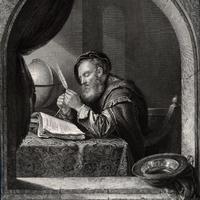'Writing Technologies' Study Day
Similar events

An international study day marking the culmination of two years as an interdisciplinary TORCH Network, and envisioning future activities. Each panel picks up central themes explored by the Network over the course of its workshops, study days, and speaker events so far, with a final roundtable looking ahead to where this thinking will take us next.
To attend this event onsite, please register here: https://www.eventbrite.co.uk/e/writing-technologies-study-day-tickets-429632491347
If you would like to join us online, please register here: https://us06web.zoom.us/meeting/register/tZMrd-qvqDkjHdH7tm06Ln3DptfHpoSVoDyB
(After registering, you will receive a confirmation email containing information about joining the meeting)
Conveners: Jenny Oliver (Worcester), Marie Thébaud-Sorger (CNRS), Viktoria Von Hoffmann (F.R.S.-FNRS, Université de Liège)
Contact: writingtechnologies@torch.ox.ac.uk
Download the programme here I Abstracts are available here.
PROGRAMME
9:00 Registration
9:15 Welcome: Jenny Oliver (Worcester College, Oxford) and Marie Thébaud-Sorger (CNRS, Paris)
9:30 Panel I: Hands, touch, and gesture
Chair: Viktoria von Hoffmann (F.R.S.-FNRS, University of Liège)
Making, writing, pointing, demonstrating, feeling, representing… hands work hard in early modern (making of) texts and images. This panel examines the language, imagery, and practices of handling, manipulation, and manoeuvre, exploring the importance of touch and ‘the knowing hand’ to writers, technicians and printers, as well as the forms and implications of prosthesis.
John Gagné (University of Sydney): ‘Mechanism/Organism: The Premodern Iron Hand’
Rachel Hindmarsh (Trinity College, Oxford): ‘Imagining Touch: Medicine, Literature, and Prosthesis’
Joe Moshenska (University College, Oxford): ‘The Jaguar’s Hand’
11:00 Coffee
11:30 Panel II: From maniera to virtuosity: early modern embodied ingenuity
Chair: Caroline Warman (Jesus College, Oxford)
This panel, carrying over and expanding certain interests from the first, explores the imaginative, authorial, and material practices deployed by writers, inventors, experimenters, artists, and artisans: embodied ingenious gestures, performances at the boundaries of nature and artifice, and the entanglement of organic and mechanical functions of body and language.
Vittoria Fallanca (New College, Oxford): ‘Montaigne’s maniera’
Pascal Brioist (University of Tours): ‘The “mechanics” of birds according to Leonardo da Vinci’
Mélanie Traversier (University of Lille): ‘The enchanting virtuosity of machines and mechanisms of artistic virtuosity in the Enlightenment period’
13:00 Lunch
14:15 Panel III: Unruly elements and environments
Chair: Katherine Ibbett (Trinity College, Oxford)
Both the concept of the classical ‘elements’ and the notion of ‘environment’ propose neat divisions that are rapidly called into question by practical experiences of, and poetic responses to, nature. This panel explores the tensions between ‘elemental’ namings and framings, and the more complex, ‘unruly’ realities they would seek to make sense of.
Phillip John Usher (New York University): ‘Inventing Botany’
Tina Asmussen (Deutches Bergbau-Museum, Bochum): ‘Unruly Entanglements: Elemental Powers in Early Modern Mining Landscapes’
Jerôme Baudry (EPFL Lausanne): ‘Science in the Mountains: Reconstructing the Scientific Expeditions of the 1770s to Mont Buet’
15:45 Tea
16:15 Roundtable: New Directions: (IM)PRINT
Chair: Jenny Oliver (Worcester College, Oxford)
This roundtable will open up questions relating to the proposed new focus for the network, centering on the complex interrelation of literary, artistic-technical, and scientific forms of experimentation and innovation in the early modern period, and paying particular attention to conceptions of the human (mechanical and organic) and the mutual imprinting of humans and their built and natural environments. Participants will address the intertwining of the material senses of print and imprint (from writing, drawing, and grafting to developments in mechanised print processes) with the immaterial, cognitive sense of ‘impression’ as an early modern figure of imagination.
Speakers: Katie Chenoweth (Princeton), Michael Drolet (Worcester College, Oxford), Rob Iliffe (Linacre College, Oxford), Matthew Landrus (Wolfson College, Oxford), Yelda Nasifoglu (History, Oxford), Perig Pitrou (CNRS, MFO), Marie Thebaud-Sorger (CNRS, Paris), John Christie (Oxford), Wes Williams (Oxford, TORCH)
18:00 Close
Bodleian 'Writing Technologies' printing workshops:
Two printing workshops for up to 12 people each will be held at 2-3.30pm and 4-5.30pm on Thursday 27th October at the Bodleian Libraries Centre for the Study of the Book. In the workshops, we will explore a range of early modern and modern printing techniques, and each session will produce its own version of the conference programme, to be exchanged on the day of the conference. While first priority for places will go to existing Network members, we anticipate there may be some availability; please let us know if you would like to be added to the waiting list to join one of the workshops, and if you have a preferred time slot.
With the support of TORCH, the F.R.S.-FNRS, the Research Unit Traverses, the University of Liège, and the Maison Française d'Oxford.



